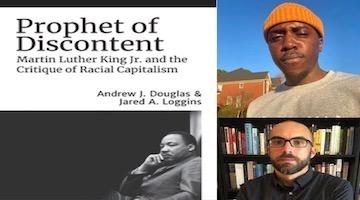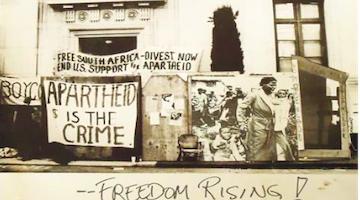An interview with Dr. Karen Wilson- Ama’Echefu.
“I started singing a couple of spirituals, but then ‘This is the scene of a crime’ just started flowing out of me.”
Dr. Karen Wilson-Ama’Echefu is a modern day griot. She bears witness to the culture of Africa and the diaspora through storytelling, singing, teaching, dancing and music. Karen grew up in Harlem, New York but resides in Washington, DC where she contributes to the political culture and struggles currently underway in the tri-state area that includes Maryland and Virginia. Her doctorate degree is in US History and she conducts workshops on Arts in Education across the United States.
Dr. Wilson-Ama’Echefu, recently penned a song that has become a political anthem in the Washington, DC area called “This is the Scene of a Crime.” The song was initially written to tell the story of how African people were enslaved, tortured, murdered and now their remains desecrated by the County and private businesses in the Bethesda, Maryland Moses African Cemetery. The song has inspired communities committed to exposing crimes against African people and providing a vehicle to narrate experiences that are often too painful to articulate. Karen encourages communities to creatively use this song to tell their stories by exchanging locations, names and conditions in order to speak to their material and spiritual challenges. A link to the song can be found at the conclusion of this interview.
BAR: Amilcar Cabral asserted that National Liberation is necessarily an act of culture. As a storyteller, why do you think this platform is a meaningful venue for discussing complex socio-political issues?
Wilson-Ama’Echefu: Yes, Cabral said that liberation is an act of culture but at the same time, he also told us, and this is a paraphrase, the poor do not fight for ideas… but for bread. We see this throughout our history as our ancestors used story, and maintained the undeniable alliance of music and dance, to both radicalize and educate communities. Not only can we create a rich reality through culture, we can bring people into that reality with us so that they can experience it in a profound way. We can present issues and work through problems together and no one need suffer the experience. We can take on and learn new tools to problem solve through story. Story is powerful that way.
Black people are deep thinkers, but our intellectuality does not exist in isolation. Neither does our art. We do not face the challenge of separation between body and mind. Story fits the flow of our lives – surely, we are not alone in this. The closer people are to their own core, their own rhythm, the more story will flow – and with that their truth, ideas; move that are organic and true to that people. Observers with a Western or European orientation have often missed the substance that flows with our style. Our eloquence is seldom far from our movement, and our movement is inextricably intertwined with our music. So story often links music, movement, and mind. This is where we find the rich lode where our intellectuality and creativity are joined.
When those who are not deeply connected with our communities experience the expression of our intellectuality through song, dance and story, they confuse our substance for an instinctive style. What they are actually experiencing is the embodiment of African diasporic cultural and intellectual thought.
BAR: What does storytelling have to do with activism and National Liberation?
Wilson-Ama’Echefu: Nations are built on story all over the globe, because the narrative integrates itself into the human soul– it comes from the blood, informs the mind, and moves back into the blood again. Here, blood is a metaphor for life. By this I mean that story grows out of our unconscious narrative -- one that reflects our histories or the stories of those that have come before our own life experiences, our loves, and our need to tell the truth -- this is the blood. Story moves into the mind so that we can consciously wrangle with questions. This is the level at which we can formulate them, possibly the most important part of this process. Once we have questions, answers may be plural, complimentary, almost secondary (because though a good answer can make you think you’re done, a good question can lead you to many rich and satisfying answers over many years.) Then story moves back into the heart to touch and move us to action. There is your activism.
Story is the platform that can give us an experience without demanding that we go through it. This makes story, and whatever supports it, precious.
BAR: How did the song “This is the Scene of a Crime” come to be?
Wilson-Ama’Echefu: We were at the cemetery and it was my first day at the protest. People were chanting ” this is the scene of a crime" and you (Marsha Coleman Adebayo) asked me if I could lead a chant? I said that I didn't know about that, but that I could sing. I started singing a couple of spirituals, but then this is the scene of a crime just started flowing out of me. The words are really speaking to those foreman, workers, security guards, questionable archaeologists, and others who are being paid to carry out the unspeakable desecration of our ancestors. The next week, Elizabeth Rosenberg, one of the organizers for the Bethesda African Cemetery Coalition (BACC) and I were working through the song when another musician stepped forward to comment that the song was a Blues. We started to work out the chords to the song. From my perspective, I believe that elements of the Blues let us know that Africa is in the house but I did not intentionally write the song. The song came through me rather than to me.
BAR: How do you feel when you hear activist singing your song?
Wilson-Ama’Echefu: I feel grateful to have been the person through whom it came. I love the phrase “this is the scene of a crime” when I first heard it. I thought it was a deep truth. Now we can all embrace that deep truth together. It comforts us and it rocks many with a little two-step movement, while it allows us to speak truth. It touches those that hear it. It makes us one. This is what is important about song and particularly about the Blues.
This is the Scene of a Crime by Karen Wilson-Ama’Echefu:
https://juliasienkiewicz.bandcamp.com/track/the-scene-of-the-crime
credit: Julia Sienkiewicz
Video version: “This is the Scene of a Crime ” by Karen Wilson-Ama’Echefu: https://www.youtube.com/watch?v=xp7mEMHRWU4&feature=youtu.be
credit -Tommy Divita photo credit, Part I: Michael J. Elderman
Please sign this petition: http://chng.it/rphgSx74th
Contact County Executive Marc Elrich and tell him:
Stop the genocide on Moses African Cemetery! Call Marc at Phone: 240-777-2550
Email: marc.elrich@montgomerycountymd.gov Tweet: @marc_elrich
Dr. Marsha Adebayo is the author of the Pulitzer Prize nominated: No FEAR: A Whistleblowers Triumph over Corruption and Retaliation at the EPA . She worked at the EPA for 18 years and blew the whistle on a US multinational corporation that endangered South African vanadium mine workers. Marsha's successful lawsuit led to the introduction and passage of the first civil rights and whistleblower law of the 21st century: the Notification of Federal Employees Anti-discrimination and Retaliation Act of 2002 (No FEAR Act). Marsha was inducted into the Maryland Women’s Hall of Fame, March 2017. Currently, she is working to stop Montgomery County and HOC from its continue desecration of an African burial ground in Bethesda, Maryland.
COMMENTS?
Please join the conversation on Black Agenda Report's Facebook page at http://facebook.com/blackagendareport
Or, you can comment by emailing us at comments@blackagendareport.com



















